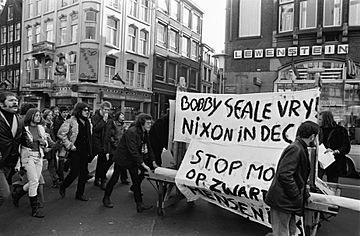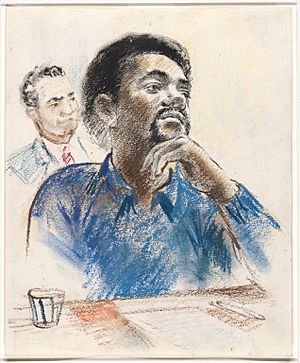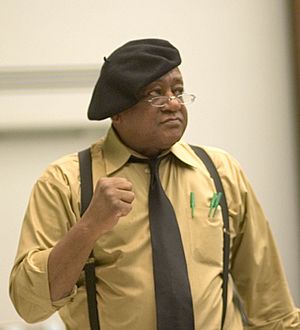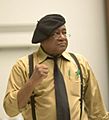Bobby Seale facts for kids
Quick facts for kids
Bobby Seale
|
|
|---|---|
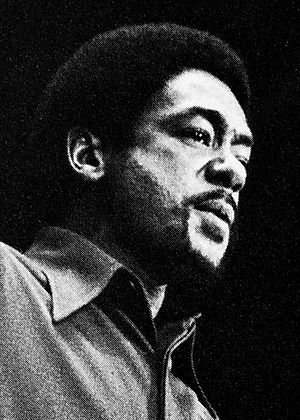
Seale in 1971
|
|
| Born |
Robert George Seale
October 22, 1936 Liberty, Texas, U.S.
|
| Education | Merritt College |
|
Notable work
|
Seize the Time: The Story of the Black Panther Party and Huey P. Newton |
| Political party | Black Panther |
| Spouse(s) |
Artie McMillan
(m. 1965; div. 1977)Eufrocina Icasas
(m. 1983; div. 1985) |
| Partner(s) | Leslie Johnson (1971–present) |
Robert George Seale (born October 22, 1936) is an African American activist and writer. He is famous for helping to start the Black Panther Party (BPP) with his friend Huey P. Newton. This group was first called the "Black Panther Party for Self-Defense." Their main goal was to watch police activities and speak out against unfair treatment of Black people in their communities. They started in Oakland, California, and then spread to other cities across the United States.
Seale was one of the eight people accused by the U.S. government of planning protests against the Vietnam War in Chicago, Illinois, during the 1968 Democratic National Convention. His time in court was widely known. At one point, he was even tied up and had his mouth covered in court because the judge said he was causing disruptions.
Later, Seale's case was separated from the others, changing the "Chicago Eight" to the "Chicago Seven." The government decided not to try him again for the planning charges. Even though he was never found guilty in that case, the judge sentenced him to four years for disrespecting the court. This sentence was later overturned.
In 1970, while in prison, Seale was accused in the New Haven Black Panther trials. The jury could not agree on a decision in his trial, and the accusations were eventually dropped.
Seale has written several books, including A Lonely Rage: The Autobiography of Bobby Seale, Seize the Time: The Story of the Black Panther Party and Huey P. Newton, and Power to the People: The World of the Black Panthers (with Stephen Shames).
Contents
Early Life and Education
Bobby Seale was born in Liberty, Texas. His father, George Seale, was a carpenter, and his mother, Thelma Seale, was a homemaker. His family lived in difficult financial conditions for much of his early life. After moving around Texas, his family moved to Albany, California, when he was eight years old. This move was part of the Great Migration, when many African Americans moved from the Southern U.S. to other parts of the country.
Seale went to Berkeley High School. He left school in 1955 and joined the United States Air Force. Three years later, he was disciplined for a disagreement with a commanding officer.
After leaving the Air Force, Seale worked as a mechanic in different aerospace factories. At the same time, he studied at night to earn his high school diploma. He then attended Merritt Community College where he studied engineering and politics until 1962.
While in college, Bobby Seale joined the Afro-American Association (AAA). This group focused on learning about African and African-American history, as well as discussing ideas about society and politics. Through this group, Seale met Huey P. Newton.
In 1966, Seale worked at a youth program in North Oakland. He taught young people about Black American History and encouraged them to help their communities. During this time, Seale met Bobby Hutton, who later became the first person to join the Black Panther Party.
Seale married Artie McMillan, and they had a son named Malik Nkrumah Stagolee Seale.
Activism and Leadership
Starting the Black Panthers
Bobby Seale and Huey P. Newton were greatly inspired by the ideas of activist Malcolm X, who had passed away in 1965. In October 1966, Seale and Newton came together to create the Black Panther Party for Self-Defense. They adopted Malcolm X's idea of "freedom by any means necessary."
Before starting the Black Panther Party, Seale and Newton formed a group called the Soul Students Advisory Council. This group aimed to help develop leaders who would go back to the Black community and serve it in a revolutionary way.
After this, Seale and Newton founded the Black Panther Party. They wanted to organize the Black community to express their needs and stand up against unfair treatment. Seale described the Panthers as a group that represented Black people and worked against a system that was unfair and racist.
In 1967, Seale and Newton got copies of Quotations from Chairman Mao Zedong to sell. They used the money they earned to buy weapons. These weapons were for Black Panther Party members to protect themselves against police brutality.
Writing and Goals
Seale and Newton wrote important documents for the Black Panther Party. These included "What We Want Now!" which listed the practical things they believed were needed. They also wrote "What We Believe," which explained the main ideas of the party. These writings were part of the party's Ten-Point Program. This program was a set of guidelines for the party's goals and how it would operate.
Newton was named the Minister of Defense, and Seale was the Chairman of the party. During his time with the Panthers, Seale was watched closely by the Federal Bureau of Investigation (FBI).
In 1968, Seale wrote Seize the Time: The Story of the Black Panther Party and Huey P. Newton.
The Chicago Eight Trial
Bobby Seale was one of the original "Chicago Eight" people accused of planning protests and causing trouble during the 1968 Democratic National Convention in Chicago. He said that being a revolutionary meant being an "Enemy of the state" and that being arrested for this struggle meant being a "Political Prisoner." There was not much evidence against Seale, as he had only been in Chicago for two days of the convention. He was a last-minute replacement for another activist.
During the trial, Judge Julius Hoffman ordered Seale to be tied up and have his mouth covered in the courtroom. This happened because Seale spoke out about not having his own lawyer present. He was tied up for several days of the trial.
Even though he was never found guilty in the main case, on November 5, 1969, Judge Hoffman sentenced Seale to four years in prison for disrespecting the court. The judge eventually decided to separate Seale's case from the others. The remaining defendants were then called the "Chicago Seven".
New Haven Black Panther Trials
While serving his four-year sentence, Seale was part of the New Haven Black Panther trials in 1970. Another Panther member, George W. Sams Jr., said that Seale had told him to harm Alex Rackley, who was suspected of being a police informant. Large protests took place in New Haven during the trials. The jury could not agree on a decision in Seale's trial, and the accusations were eventually dropped. His sentence for disrespecting the court was also stopped, and Seale was released from prison in 1972.
Later Activities
In 1973, Seale ran for Mayor of Oakland, California. He came in second place out of nine candidates. Although he did not win, his strong showing forced the current mayor into a second round of voting.
In 1974, Seale and Huey Newton had a serious disagreement about a film project. After this, Seale decided to leave the Black Panther Party that year. Seale has said that he and Newton remained friends and that rumors of a physical fight were not true.
The Ten Point Platform
Bobby Seale worked with Huey Newton to create the Ten Point Platform. This document listed the political and social demands they believed were needed for Black people to thrive in the United States. They developed these ideas in the late 1960s, and they became the foundation of the Black Panther Party.
The document talked about the unfair economic treatment of Black people and addressed the mistreatment of the Black community. It was appealing to those who felt oppressed. The platform suggested that a mix of racism and unfair economic practices led to problems in the United States.
The Ten Point Platform called for full employment for Black people, good housing, and a good education. They defined a good education as one that taught the full history of the United States, including the displacement of Native Americans and the enslavement of Africans. The platform also called for the release of political prisoners.
The ten points are:
- We Want Freedom. We Want Power To Determine The Destiny Of Our Black Community.
- We Want Full Employment For Our People.
- We Want An End To The Robbery By The Capitalists Of Our Black Community.
- We Want Decent Housing Fit For The Shelter Of Human Beings.
- We Want Education For Our People That Exposes The True Nature Of This Decadent American Society. We Want Education That Teaches Us Our True History And Our Role In The Present-Day Society.
- We Want All Black Men To Be Exempt From Military Service.
- We Want An Immediate End To Police Brutality And Murder Of Black People.
- We Want Freedom For All Black Men Held In Federal, State, County And City Prisons And Jails.
- We Want All Black People When Brought To Trial To Be Tried In Court By A Jury Of Their Peer Group Or People From Their Black Communities, As Defined By The Constitution Of The United States.
- We Want Land, Bread, Housing, Education, Clothing, Justice And Peace.
Other Work and Later Life
In 1978, Seale wrote his autobiography called A Lonely Rage. In 1987, he wrote a cookbook titled Barbeque'n with Bobby Seale: Hickory & Mesquite Recipes. The money from this book went to help different non-profit groups. Seale also appeared in advertisements for Ben & Jerry's ice cream.
In 1998, Seale was featured in the TV show Cold War, where he talked about events from the 1960s. He was also a main person in the 1999 documentary Public Enemy. In 2002, Seale started focusing his time on Reach!, a group that creates education programs for young people. He has also taught black studies at Temple University in Philadelphia.
Also in 2002, Seale moved back to Oakland. There, he worked with young political activists to encourage social change. In 2006, he appeared in the documentary The U.S. vs. John Lennon to talk about his friendship with John Lennon. Seale has visited over 500 colleges to share his experiences as a Black Panther and to give advice to students interested in community organizing and social justice.
Since 2013, Seale has been working to produce a movie script he wrote. It is based on his autobiography and is called Seize the Time: The Eighth Defendant.
Seale also co-wrote Power to the People: The World of the Black Panthers in 2016 with photographer Stephen Shames.
Images for kids
See also
 In Spanish: Bobby Seale para niños
In Spanish: Bobby Seale para niños
 | Jewel Prestage |
 | Ella Baker |
 | Fannie Lou Hamer |


